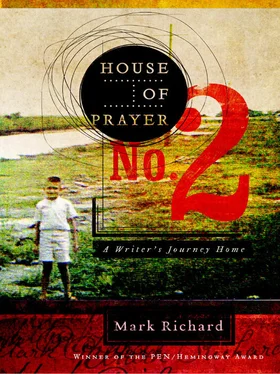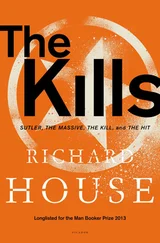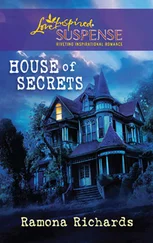Your history teacher tells your class that Nat Turner baptized a white man and that some people saw a white dove hover above them in the river. Nat Turner asked for signs from God, and he was given hieroglyphics on corn leaves. When he wanted more signs from God, he was given a green eclipse of the sun that was witnessed from Charleston, South Carolina, to New York City, so he and his disciples began killing as many white people in your county as they could, mostly with axes, swords, and hand tools. In two days they killed fifty-six people, most of them women and children, ancestors of many of your white classmates. Hundreds of blacks were killed in the weeks afterward, the ancestors of some of your black classmates.
Before they cut off Nat Turner’s head and spiked it on a crossroads daring anyone to touch it, Nat sat in his cell and confessed that he was a prophet, a man of God.
THE SUMMER AFTER FIFTH GRADE you limp down to the black swamp riverbank, there’s an old truck someone tried to drive into the water years ago. It’s now just a hulk rusting deep in a ravine of blackberry bushes. You have to crawl through underbrush to get to it and climb in through the driver’s window. The front fender is in the black water of the river creeping past. You can reach out and pick blackberries to eat right off the bushes and nobody knows where you are.
You are sitting down there one day behind the wheel eating blackberries and you faintly recognize a pattern on the old broken dashboard, the sun-corrupted leather split into squarish diamonds in a long pattern running the length of the dashboard, its triangular head moving toward you over the Sputnik-antennae turn signal jutting from the steering column, the split black tongue flickering, flickering, a sharp black bead of eye watching you as the water moccasin corners efficiently toward you from its hothouse sunning spot where the windshield creases into the dashboard. The only exit for you both is through the driver’s side window, the snake’s body now holding itself out firmly as a hurdle you must somehow with your skeletal legs superhumanly leap over to escape. Bracing your back so hard against the rusty springs of the backseat cushion in advent of your escape that you can feel them cut into your skin, you supernaturally fly out the driver’s side window, your right kneecap rapping the snake’s head with a bone-woodenish comic knock as you fly past.
After that your haunts are the library and the movie house. The library is in the old Pace family house, large enough so that the nine children roller-skated upstairs where the school board offices are now. There are hidden staircases and several sunporches. The place is haunted, not just by you or Miss Cutchins. Miss Cutchins knew your father didn’t allow you to watch television when you were in your body cast, so she helped your mother select books for you to read by the grocerybagful. She will never deny you a book, though when you check out your books, signing your name so that she can read it , she will hold your book as if she can gauge its merit by its weight. Then she will inspect its spine, and if she is unfamiliar with the title, she might thumb through it while you lean on creaking crutches, if you are still on them, in front of her desk. She might read a few pages. She might deny a friend of yours a book until he is older, but never you, maybe because she knows you will slip off to one of the sunporches and read it anyway. She also knows that you will wait until she slips into one of the sunporches for her afternoon nap, that you will sign your name on the card so that she can read it, leave it on her desk, and swing your legs quietly out the door.
There had long been rumors of Playboy magazines in the closet behind Miss Cutchins’s desk. One afternoon when Miss Cutchins is resting on the sunporch, and you could hear her resting out there, not quietly, you screw up your courage and open that closet door but all you find are years of your town’s telephone books and Miss Cutchins’s plastic rain bonnet.
When you confide to your best friend about your unsuccessful attempt to find a Playboy magazine, he tells you the solution is simple: all you have to do is go down to the bus station behind the queer real estate guy’s office and steal one. The long afternoon you stand across from the bus station on your crutches you learn an important lesson: there are many great protections against temptation, and cowardice is one of the best.
The other person who haunts the old library is a Pace sister. She died a long time ago, and people think she is the reason books fall from the stacks, the broken clock in the main reading room chimes, and the front door sometimes opens and closes by itself. The librarians take the Pace sister’s presence for granted. The people in the school board office upstairs aren’t so sure, until in the middle of one of their meetings a woman came into the room, someone they thought at first must have been homeless and looking for the welfare office, her clothes were old and odd. When the secretary asked the woman if they could help her, the woman turned and disappeared into a wall.
Since then, they think they’ve identified the woman from an old photograph that is one hundred and forty years old. To this day, if you ask people who work in that building about the Pace sister, they usually say, I don’t know, I just know she seems to hang around that front parlor .
Your other haunt is the movie theater owned by the alcoholic gay musician from Indiana who arrived first in a small Carolina town just over the border in a raccoon coat to play the enormous pipe organ they had installed in their movie house and nobody could get much music out of. People say he played at Radio City Music Hall and with the Mormon Tabernacle Choir. He’s a nice man when he’s sober. Sometimes when he’s drinking, he bursts into the Saturday matinee in the middle of Flipper and chases children screaming into the street. You hang back and wait for him to climb the stairs to the projection room and see if the projectionist is able to talk him into going home. When you see the film begin to jump out of its sprockets on the screen into blinding whiteness, you figure it’s time to go.
The projectionist lives on your street, and sometimes he lets you follow him down to open up the theater, and he lets you in for free if you help turn on the lights and start the popcorn, and you sit up in the Colored Balcony, the best seats in the house, where sometimes there’s a party when the black children, who have to come up through an outside fire escape entrance, flatten popcorn boxes and send them sailing into the white audiences below.
Once, coming through the lobby, you tell the owner that was the best movie you have ever seen, and he says yes, Laurence Olivier is pretty good. Then he asks you if you would like a job there, and you say no, you and all of your friends have been warned away from the owner by parents. One Halloween, way after it was time for you and your best friend to be home from trick-or-treating, you found yourselves at his house loading up on the candy no one else had come to collect. The only people out on the streets were black teenagers throwing eggs and it was a long walk home. Your best friend called his mother, and when he told her where you were, she yelled, I’ll be right there!
The woman who takes tickets at the movie theater says she’s been raped by a black man and the police catch him. She never gives you back your change because you don’t look twelve, she says you look too old for a kid’s ticket. Without that ten cents you can’t get any popcorn. You stop pressing her for the dime after she throws it at you saying, Here!
Читать дальше













